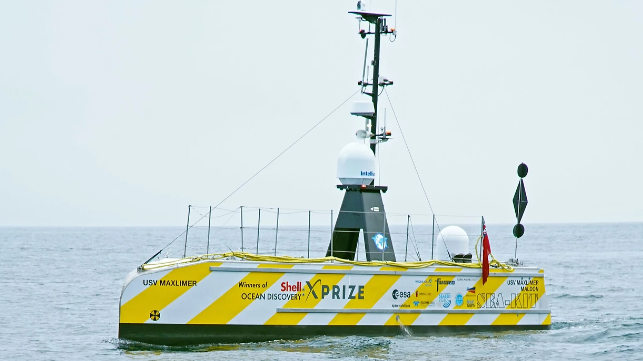Sea-Kit Completes Unmanned Survey Voyage in N. Atlantic

The remotely-controlled survey boat Maxlimer has completed a 22-day trial mission to map the seabed off England's southwestern coast, according to developer Sea-Kit.
Sea-Kit had hoped to conduct a transatlantic voyage with the Maxlimer this year, but it postponed the plan due to the COVID-19 pandemic. Instead, the vessel used its multi-beam sonar to profile an under-surveyed area of about 300 square nautical miles near the entrance to the English Channel.
The firm's command center in Essex controlled the vessel remotely, 24/7, for the duration of the test. After three weeks of operation, the boat came back to port with about one-third of its fuel supply still remaining, Sea-Kit said.
"The project’s overall aim was to demonstrate the capabilities of current technologies to survey unexplored or inadequately surveyed ocean frontiers, and we have absolutely done that. It is a ground-breaking achievement to prove true over-the-horizon capability," said Sea-Kit's director of technology, Peter Walker.
The offshore survey company Fugro recently placed an order with Sea-Kit for two new vessels like Maxlimer, and it was involved in the trial run. In a statement, Fugro director of remote inspection Ivar de Josselin de Jong said that the test was a vindication of its strategy. “This proof of concept is exciting and confirms Fugro made the right choice to partner with SEA-KIT to develop a range of USVs that will transform the marine industry,” he said. Their partnership includes the development of a much larger 24-meter USV, which will be designed to deploy ROVs and AUVs for subsea inspections.

that matters most
Get the latest maritime news delivered to your inbox daily.
The trial voyage had the support of many other partner organizations, including the Global Marine Group, Map the Gaps, Teledyne CARIS, Woods Hole Group and The Nippon Foundation. It also received funding from the UK Space Agency and regulatory support from the UK Maritime and Coastguard Agency. UK MCA provided Sea-Kit with a regulatory waiver and a load line exemption, which allowed the company to operate the vessel without an onboard crew.
“This was a really exciting journey, and a great opportunity for us to support a company at the forefront of new developments and pushing boundaries for remotely operated vessels," said UK MCA's smart ships and automation policy officer, Dr. Katrina Kemp. “We believe that [unmanned] shipping will play a important role in the future of maritime in terms of reducing carbon emissions by using less fuel and allowing vessels to go to places or situations where people may be put at risk.”
